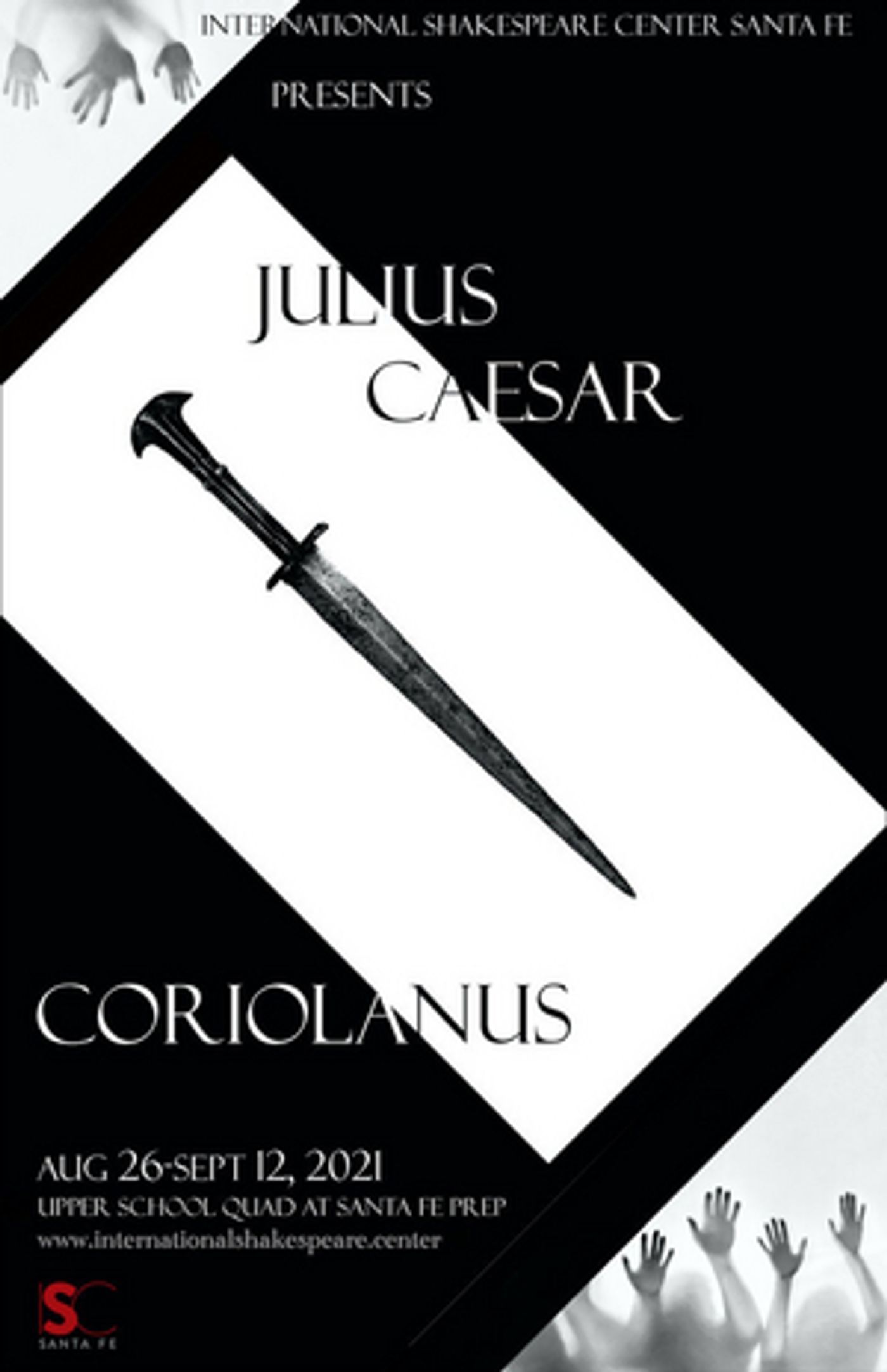Review: THE ROMANS: JULIUS CAESAR and CORIOLANUS at the International Shakespeare Center
Performed in rep through September 12th only!

As was the case with many theatre companies in Santa Fe and around the country, the International Shakespeare Center cast what was intended to be their second repertory season in early 2020, only to have those plans be put on hold by the COVID-19 pandemic. The casts continued to work via Zoom in the interim, and though there were some shifts in casting over the year and a half pause, that season, billed as "The Romans" - consisting of timely productions of Julius Caesar and Coriolanus - opened last weekend at the quad at Santa Fe Preparatory School (1101 Camino de Cruz Blanca), proving itself to be well worth the wait.
Julius Caesar, which is one of Shakespeare's several brilliant works thought to have been written in 1599, was directed by ISC artistic director Ariana Karp to great effect. The tale, in which Cassius and Brutus (here played superbly by Geoffrey Pomeroy and Lynn Goodwin - last seen together as Edmund and Goneril in the ISC's 2018 production of King Lear) conspire to assassinate Julius Caesar (an immensely engaging and likeable Deborah Davis) and, after succeeding, must grapple with the consequences of their actions, is cut down to less than two and a half hours. Characters who are omitted are not missed; in many instances, there are brilliant combinations of characters presented as the same person (notably Casca, who is combined with Titinius, played by the consistently excellent Breshaun Joyner). The end result is an accessible, engaging, fast paced political thriller. Due to the recent monsoon season weather Santa Fe has seen, the night I saw it was actually the first full run of that play in the space; this was occasionally evident in some seeming lack of confidence in lines, and though the rain had moved through by the start of the show, strong winds also occasionally rendered performers slightly difficult to hear. (Dressing in layers or bringing a coat is recommended; it can get a bit chilly at night.)
Coriolanus - a later, lesser known play, believed to have been written sometime between 1605 and 1608 - is inherently a more difficult sell; in the more than capable hands of guest director Edward Daranyi, the action here is also well edited and paced (also less than two and a half hours) and intriguing, while also being full of characters with whom the audience can connect and empathize. In essence, Caius Marcius (later known as Coriolaus) is a man of inflexible but noble ideals who finds himself caught within political machinations with which he is not equipped to engage; here, Pomeroy crafts the most sympathetic Coriolanus I have ever seen. He does not play the character as an obstinate brute, but rather a man so authentic, so honest, that he cannot "play the game"; his tragedy is that nearly everyone around him absolutely does. Lynn Goodwin appears this time transformed into his manipulative, calculating mother, Volumnia, and Julius Caesar director Ariana Karp appears here as Coriolanus's rival turned collaborator, Volscian army commander Tullus Aufidius with a passionate, raw performance.
Scenic design by Vincent Faust is minimal but nonetheless works well for both productions; the quad area at Santa Fe Preparatory School is a remarkably effective venue and very well utilized. Lighting design by Jayden Chavez is solid, and the sound design by Ms. Karp and Mr. Daranyi is very good (though it did occasionally overwhelm the voices of the actors when I was seated on the far eastern side of the audience). The costumes are simple, but logical for all characters and very effective for the needs of the production (credit to the team including both directors, Katrin Talbot, and Kate Healy).
The strength of the edits, direction, and production design of both plays aside, the greatest asset of these productions is the incredibly tight ensemble of players who perform both shows; the effectiveness of the common language, the common universe the entire company of actors inhabits without exception is a key element in the way these plays both wholly transcend the potential difficulties of production. Both standard ISC company members (to name just two, Mairi Chanel shines in particular in Coriolanus as Menenius Aggrippa; NMSA student Clara West plays a variety of roles across both productions with total earnestness) and newcomers (Alexander Lane, who turns out deeply nuanced takes on each of his multiple characters; William Potter disappears into each new character so fully that he is nearly unrecognizable with each change, in brief) alike turn out gorgeous, honest, dynamic performances and have the opportunity to demonstrate their not insignificant range across the two plays; it is this reviewer's strong recommendation that if at all possible, audience members catch both productions to see the remarkable transitions every actor in company performs over the course of the weekend.
The 2021 International Shakespeare Center repertory company includes Ariana Karp, Edward Daranyi, Rhoda Bodzin, Mairi Chanel, Deborah Davis, Lynn Goodwin (AEA), Meg Hachmann, Breshaun-Birene Joyner, Alexander Lane, Geoffrey Pomeroy, William Potter, and Clara West.
Performances of The Romans (Julius Caesar and Coriolanus) continue through September 12; shows are on Thursdays through Saturdays at 7:30 pm and Sundays at 2 pm.
For more information, visit https://www.internationalshakespeare.center/isc-rep-2021; tickets available at https://www.tix.com/ticket-sales/internationalshakespearecenter/6671/. Masks are strongly encouraged.
Reader Reviews
Videos

